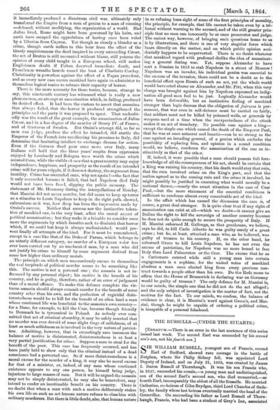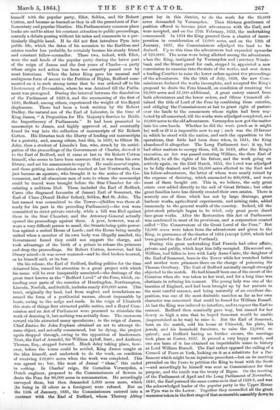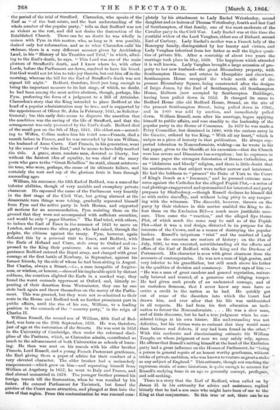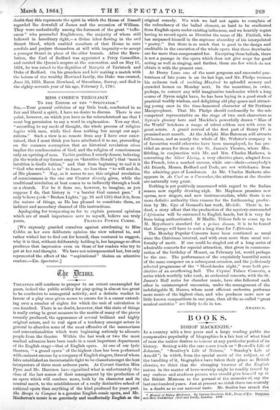THE RUSSELLS.—(UNDER THE STUARTS.)
[ERRATUM.—There is an error in the last sentence of this series issued last week. The second Earl was succeeded by his second son's son, not his fourth son.] SIR WILLIAM RUSSELL, youngest son of Francis, second Earl of Bedford, showed rare courage in the battle of Zutphen, where Sir Philip Sidney fell, was appointed Lord Deputy of Ireland, and on July 21, 1603, was created by James I. Baron Russell of Thornhaugh. It was his son Francis who, in 1627, succeeded his cousin,—a young man and undistinguished, son of the second Earl's second son, who died unmarried,—as fourth Earl, incomparably the ablest of all the Russells. He married Catherine, co-heiress of Giles Brydges, third Lord Chandoe of Sude- ley, the family whose last heiress eventually married the head of the Grenvillee. On succeeding his father as Lord Russell of Thorn- haugh, Francis, who bad been a student of Gray's Inn, associated
himself with the popular party, Eliot, Selden, and Sir Robert Cotton, and became as learned as they in all the precedents of Par- liamentary and popular liberties. His Parliamentary common-place books are said to attest his constant attention to public proceedings, scarcely a debate passing without his notes and comments in a par- ticularly illegible hand. If he did not first introduce Pym into public life, which the dates of his accession to the Earldom and estates render less 'probable, he certainly became his steady friend and constant fellow-counsellor. These two, indeed, with Eliot, were the real heads of the popular party during the latter part of the reign of James and the first years of Charles—a party whose origin and action has been too cursorily passed over by most historians. When the latter King gave his unusual and ambiguous form of assent to the Petition of Rights, Bedford com- mented on it in such strong terms that he was ordered off to his Lieutenancy of Devonshire, where he was detained till the Parlia- ment was prorogued. During the interval between the dissolution of the Parliament of 1628.9, and the summoning of the first of 1640, Bedford, among others, experienced the weight of the Royal displeasure. There had been a book written by Sir Robert Dudley, the nataral son of the Earl of Leicester, in the time of King James, " A Proposition for His Majesty's Service to Bridle the Impertinency of Parliaments." It had been presented in manuscript to James, and highly approved of, and eventually found its way into the collection of manuscripts of Sir Robert Cotton. His librarian took the liberty of lending out manuscripts for a gratuity, and, among others, lent this, in 1630, to Oliver St. John, then a student of Lincoln's Inn, who, struck by its antici- pation of the proceedings of the Government of Charles, showed it to the Earl of Bedford, and it came at last to Sir Robert Cotton himself; who seems to have been unaware that it was from his own library, and set his amanuensis to copy it. He made several copies, and these getting into circulation reached at last Wentworth, then just become an apostate, who brought it to the notice of the Go- vernment, and all obnoxious men of note to whom the manuscript could be traced were brought before the Star Chamber for cir- culating a seditious libel. These included the Earl of Bedford, Carre (the disgraced favourite of James) Earl of Somerset, the Earl of Clare (Denzil Holies' father), Selden, fflnd St. John. The last named was committed to the Tower—(Selden was there al- ready for his part in the preceding Parliament) —the rest were committed to strict private custody, while a bill was filed against them in the Star Chamber, and the Attorney-General actually opened the proceedings against them. A peer, however, was al- ways a very difficult person to assail, the Stuarts being quite power- less against a united House of Lords ; and the House being usually united when a member of its own body was illegally assailed, the Government found they could not support the charge, and took advantage of the birth of a prince to release the prisoners and drop the proceedings. Sir Robert Cotton, however, had his library seized—it was never restored—and he died broken-hearted, as he himself said, at its loss.
On his release, the Earl of Bedford, finding politics for the time debarred him, turned his attention to a great project with which his name will be ever inseparably associated—the drainage of the great tract known as the "Bedford Level" of the Fens, which, ex- tending over parts of the counties of Huntingdon, Northampton, Lincoln, Norfolk, and Suffolk, includes nearly 400,000 acres. This tract, originally dry land, had from neglect, and inundations as- sumed the form of a pestilential morass, almost impassable by boats, owing to the sedge and reeds. In the reign of Elizabeth this state of things first attracted public notice, and a Royal Com- mission and an Act of Parliament were procured to stimulate the work of draining it, but nothing was actually done. The enormous reward visible attracted many speculators ; in the reign of James, Chief Justice Sir John Popham obtained an act to attempt the same object, and actually commenced, but he dying, the project again dropped through, owing to the opposition of landowners. Next, the Earl of Arundel, Sir William Ayloff, Bart., and Anthony Thomas, Esq., stepped forward. Much delay taking place, how- ever, before the terms could be settled, King James caught at the idea himself, and undertook to do the work, on condition of receiving 120,000 acres when the work was completed. This was agreed to ; but, like most of James' " ideas," this ended in nothing. In Charles' reign, Sir Cornelius Vermuyden, a Dutch engineer, proposed to the Commissioners of Sewers to drain the Fens for 90,000 acres in remuneration. He accordingly surveyed them, but then demanded 5,000 acres more, which (he being in ill odour as a foreigner) were refused. But on the 13th of January, 1631, the Commissioners entered into a contract with the Earl of Bedford, whose Thorney Abbey grant lay in this district, to do the work for the 95,000 acres demanded by Vermuyden. Then thirteen gentlemen of position offered to become joint adventurers with the Earl, and were accepted, and on the 27th February, 1632, the undertaking commenced. In 1634 the King granted them a charter of incor- poration in consideration of 12,000 acres, and on the 13th of January, 1637, the Commissioners adjudged the land to be drained. Up to this time the adventurers had expended upwards. of 123.0001. The acres were being allotted among the adventurers when the King, instigated by Vermuyden and secretary Winde- bank and the Stuart greed for cash, stepped in, appointed a new commission to examine into the state of the works, and sent down a leading Courtier to raise the lower orders against the proceedings of the adventurers. On the 18th of July, 1638, the new Com- missioners declared the works incomplete, and accepted the King's proposal to drain the Fens himself, on condition of receiving the 95,000 acres and 57,000 additional, A great outcry ensued from both adventurers and the lower orders, and Oliver Cromwell ob- tained the title of Lord of the Fens by combining these outcries, and obliging the Commissioners at last to grant right of pasture over the lands to the commoners whose rights had been neg- lected by all concerned, till the works were adjudged completed, and 40,000 acres to the old adventurers. Vermuyden now got the matter into his own hands. Whether he did the work (such as it might be) well or ill it is impossible now to say ; such was the ill-favour in which he stood with the nation, and such the opposition to the operations, that little had been done when, in 1641, the King abandoned it altogether. The Long Parliament too'c it up, but had other matters to occupy them, till, in 1649, after the King's execution, an Act was passed restoring William, the then Earl of Bedford, to all the rights of his father, and the work going on actively again, on the 23rd March, 1653, the Level was adjudged to be fully drained, and the 95,000 acres allotted to the Earl and his fellow-adventurers, the latter of whom were nearly ruined by the expense of draining, which amounted to 400,0001., and were most of them bought out. This is, we believe, the only great estate ever added directly to the soil of Great Britain ; but other great families have less directly created their own estates. There is scarcely one of them which has not by large drainage, great harbour works, agricultural experiments, and mining risks, added immensely to the general wealth of the country. Indeed, till the joint-stock principle began to be tried, only great peers dared face great works. After the Restoration this Act of Parliament was confirmed in most of its provisions, and a corporation created called "The Conservators of the Great Level of the Fens." But 12,000 acres were taken from the adventurers and given to the King, in pursuance of the charter of 1634 (except 2,000, which had been granted to the Earl of Portland).
During this great undertaking Earl Francis had other affairs, private and public, which kept him fully occupied. His second son, William, had fallen in love with Lady Anne Carre, the daughter of the Earl of Somerset, born in the Tower while her wretched father and mother were prisoners there on the charge of poisoning Sir Thomas Overbury. The Earl of Bedford naturally enough strongly objected to the match. He had himself been one of the escort of the Countess when she was taken to her trial, and for a long time was obstinate in refusing his consent. The young lady was one of the beauties of England, and had been brought up by her parents in the most careful manner, and being naturally of an excellent dis- position, was one of the most desirable matches as far as her own character was concerned that could be found for William Russell. At last the King was induced to interfere, and to request the Earl to consent. Bedford then nominally gave way, but named for her dowry so high a sum that he hoped Somerset would be unable (impoverished as he was) to raise it. But the Earl of Somerset, bent on the match, sold his house at Chiswick, his plate, his jewels, and his household furniture, to raise the 12,0001. re- quired; and Bedford having no further excuse, the marriage took place at Easter, 1637. It proved a very happy match, and one son born of it has obtained an imperishable name in history
as Lord William Russell. The Earl rather opposed the calling of a Council of Peers at York, looking on it as a substitute for a Par- liament which might be an injurious precedent—but on its meeting prevailed on the Peers to petition the King to treat with the Scots —and accordingly he himself was sent as Commissioner for that purpose, and the result was the treaty of Ripon. On the meeting of the Parliament of April and the Long Parliament of November, 1640, the Earl pursued the same course as in that of 1628-9, and was the acknowledged leader of the popular party in the Upper House as Pym was in the Lower. Together they counselled all the great measures taken in the first etageof that memorable assembly down to
the period of the trial of Strafford. Clarendon, who speaks of the Earl as " of the best estate, and the best understanding of the whole number of the popular party," tells us that Bedford was not so violent as the rest, and did not desire the destruction of the Established Church. There can be no doubt he was wholly in unison with Pym in this matter, who, as long as it was possible,
desired only her reformation, and as to what Clarendon calls- his violence, there is a very different account given by Archbishop
Laud, in his " History of his Troubles and Trial," in which, allud- ing to the Earl's death, he says, " This Lord was one of the main plotters of Strafford's death, and I knew where he, with other Lords, before the Parliament sat down, resolved to have his blood.
But God would not let him to take joy therein, but cut him off in the morning, whereas the bill for the Earl of Strafford's death was not
signed till night." Bedford, therefore, lived just long enough to bring the important measure to its last stage, of which, no doubt, he had been among the most active abettors, though, perhaps, like Pym, preferring the form of a judgment to a Bill of Attainder.
Clarendon's story that the King intended to place Bedford at the head of a popular administration may be trua, and is supported by the appointment of Oliver St. John in February, 1641, as Solicitor- General ; but this early date seems to disprove the assertion that the condition was the saving of the life of Strafford, and that the arrangement was only prevented by the Earl's death. Bedford died of the small-pox on the 9th of May, 1641. His eldest son—accord- ing to Wiffen, Collins makes him his third son—Francis, died a month before in France, and he was succeeded by his eon William, the husband of Anne Carre. Earl Francis, in his generation, went by the name of "the wise Earl," and he seems to have fully merited the title. A grave, stern, resolute man, devoted to liberty, but without the faintest idea of equality, he was chief of the many peers who gave to the "Great Rebellion" its staid, almost aristocra- tic tone, who were, perhaps, the cause of its ultimate failure, and certainly the root and sap of the glorious fruit it bore through succeeding ages
William, his successor, the fifth Earl of Bedford, was a man of far inferior abilities, though of very amiable and exemplary private character. He espoused the cause of the Parliament very heartily in the first stage of the Civil War, but getiug alarmed at the democratic turn things were taking, gradually separated himself from Pym and the active party in both Houses, and supported all motions for an accommodation, Pym resisting these on the ground that they were not accompanied with sufficient securities, and would be only " paper liberties." The Earl tried, with others, to induce the Earl of Essex in the summer of 1643 to move on London, and overawe the ultra party, who had raised, through the pulpits, the citizens against the treaty. Pym, however, again defeated this by a personal visit to Essex, and Bedford, with the Earls of Holland and Clare, stole away to Oxford and ex- pressed to the King their penitence. As an earnest of his re- pentance Bedford entered the Royal army, and charged with great courage at the first battle of Newbury, in September, against his former friends, by the side of whom he had been sitting in August. But Charles, always a Stuart,—i.e., a man incapable of forgive- ness, or wisdom, or honour,—showed his implacable spirit by distant coldness, the courtiers alighted the Earls in a marked way, they found the worst counsels uppermost at Oxford, and, bitterly re- penting of their desertion from Westminster, they one by one stole back again and threw themselves on the mercy of the Parlia- ment. This was granted, but they were not re-admitted to their seats in the House, and Bedford took no further prominent part in public affairs, until the rise of his son, William, to a leading position in the counsels of the " country party," in the reign of Charles IL
William Russell, the second son of William, fifth Earl of Bed- ford, was born on the 29th September, 1639. He was, therefore, just of age at the restoration of the Stuarts. He was sent in 1653 to the University of Cambridge, then under the reformed disci- pline of the Puritans, which, as Clarendon admits, contributed so much to the advancement of both Universities as schools of learn- ing. He then was sent on his travels with his elder brother Francis, Lord Russell, and a young French Protestant gentleman, the Earl giving them a paper of advice for their conduct of a very elevated character. The elder brother had a melancholy temperament—which grew on him—and separating himself from William at Augsburg in 1657, he went to Italy and France, and died abroad unmarried in 1678. The younger brother pursued his foreign travels till the Restoration, when he was recalled by his father. He entered Parliament for Tavistock, but found the gaieties of the Court more attractive, and plunged at first into the mire of that region. From this contamination he was rescued com-
pletely by his attachment to Lady Rachel Wriothesley, second daughter and co-heiress of Thomas Wriothesley, fourth and last Earl of Southampton, of that family, one of the most moderate of the Cavalier party in the Civil War. Lady Rachel was at this time the youthful widow of the Lord Vaughan, eldest son of Richard, second Earl of Carbery. Lady Rachel's mother was a French lady of the Ronorguy family, distinguished by her beauty and virtues, and Lady Vaughan inherited from her father as well the higher quali- ties of private life. After a courtship of about two years the marriage took place in May, 1669. The happiness which attended it is well known. Lady Vaughan brought a large accession of pro- perty to her new husband—the great Bloomsbury property, with Southampton House, and estates in Hampshire and elsewhere. Southampton House occupied the whole north side of the present Bloomsbury Square, being constructed after the designs of Inigo Jones, by the Earl of Southampton, old Southampton House, Holborn (now occupied by Southampton Buildings), having been pulled down in 1652. It changed its name to Bedford House (the old Bedford Houle, Strand, on the site of the present Southampton Street, being pulled down in 1704), and in 1800 was sold by auction, and immediately pulled down. William Russell, soon after his marriage, began applying himself to public affairs, and rose steadily to the leadership of the popular party in the House of Commons. In 1679 he was made a Privy Councillor, but dismissed in 1680, with the curious entry in the Gazette, ordered by the King, " With all my heart," which is unique as a piece of honesty in that publication. He always sup- ported toleration to Nonconformists, wishing—as he wrote in his last paper, given to the Sheriffs at his execution—that the Church were less severe and Dissenters less scrupulous ; but he expresses in the same paper the strongest detestation of Roman Catholicism, as an " idolatrous and bloody" religion, and there is little doubt that his sentiments on that subject were rather narrow and intolerant. He had the boldness to "present" the Duke of York to the Court of King's Bench as a " Recusant," and he pursued extreme mea- sures against the Catholics for the alleged Popish Plot,—a series of real plottings exaggerated and systematized for interested and party purposes by Shaftesbury,—though Russell declares he himself did so with entire sincerity, and without being privy to any tamper- ing with the witnesses. The discredit, however, thrown on the party by their violence in this matter enabled the King to de- feat them on the Exclusion Bill—a much more justifiable mea- sure. Then came the " reaction," and the alleged Rye House Plot, of which much the same may be said as of the Popish Plot—that it was a real design, distorted in its purpose for the interests of the Crown, and as a means of destroying the popular leaders. Russell's iniquitous " trial " and the conduct of Lady Russell on the occasion are matters of history; on the 21st of July, 1683, he was executed, notwithstanding all the efforts and offers of the Earl of Bedford with the King and the Duchess of Portsmouth. His character is seen with great clearness from the accounts of contemporaries. He was not a man of high genius, and very inferior to his grandfather, but still much above his father in the qualities of decision and constancy. Burnet says of him :— " He was a man of great candour and general reputation, univer- sally beloved and trusted, of a generous and obliging temper. He had given such proofs of an undaunted courage, and of an unshaken firmness, that I never knew any man have so entire a credit in the nation as he had. He quickly got out of some of the disorders into which the Court had drawn him, and ever after that his life was unblemished in all respects. He had from his first education an incli- nation to favour the Nonconformists. . . . He was a slow man, and of little discourse, but he had a true judgment when he con- sidered things at his own leisure. His understanding was not defective, but his virtues were so eminent that they would more than balance real defects, if any had been found in the other." With this moderate and discriminating estimate Sir William Temple, on whose judgment of men we may safely rely, agrees. He affirms that Russell's setting himself at the head of the Exclusion party had a great influence on the Houses of Parliament, he " being a person in general repute of an honest worthy gentleman, without tricks of private ambition, who was known to venture as great a stake as any subject of England." This estimate, though not reaching the rapturous strain of some historians, is quite enough to account for Russell's undying fame in an age so generally corrupt, profligate, and self-seeking.
There is a story that the Earl of Bedford, when called on by James II. in his extremity for advice and assistance, replied bitterly that he had a son once who might have been of use to the King at that conjuncture. Be this true or not, there can be no
doubt that this represents the spirit in which the House of Russell regarded the downfall of James and the accession of William. They were undoubtedly among the foremost of the great " influ- ences " who persuaded Englishmen, the majority of whom still believed in hereditary right,—a divine ichor flowing in the evil Stuart blood, which enabled members of that House to cure scrofula and perjure themselves at will with impunity—to accept a younger Stuart in place of the elder branch. After the Revo- lution, the Earl of Bedford was appointed a Privy Councillor, and carried the Queen's sceptre at the coronation, and on May 11, 1694, he was raised to the dignities of Marquis of Tavistock and Duke of Bedford. On his grandson and heir making a match with the heiress of the wealthy Howland family, the Duke was created, June 30, 1695, Baron Howland, of Streatham, Surrey, and died in the eighty-seventh year of his age, February 7, 1700.

































 Previous page
Previous page